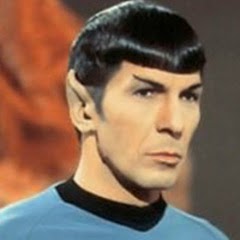Sheldon
Cooper (played by
Jim Parsons): “I'll tell you where
I've been. You boys may have had gelato with Stan Lee and gotten autographed
comics, but I saw the inside of his house and got an autographed application
for a restraining order.”
Howard
Wolowitz (played by
Simon Helberg): [sarcastically] “Sweet.”
Sheldon:
“Plus, I get to hang out with him again... at the hearing. This is going to
look great, hanging next to my restraining order from Leonard Nimoy.”— The Big Bang Theory,
“The Excelsior Acquisition,” Season
3, Episode 16, original air date March 1, 2010, teleplay by Bill Prady, Steve
Holland and Maria Ferrari, directed by Peter Chakos
I imagine that there were many real-life cases of
insane hero-worship that must have bedeviled Leonard Nimoy enough to make him title his first attempt at an
autobiography I Am Not Spock. With the passage of time, however, the actor
who created Mr. Spock of Star Trek
could look at the role not as a spur to crazy fans or as a creative straitjacket but as an assurance that
he would remain a part of popular culture. Perhaps not surprisingly, then, he
wrote a sequel: I Am Spock.
Fond memories of Nimoy—who died in Bel Air yesterday
at age 83—that came from all corners of the globe, were not something that he or
anyone else could have expected when Star
Trek (marketed to network brass as, in effect, a space western) premiered on
NBC nearly 50 years ago. (See my prior post on the 45th anniversary of the premiere.) Nor was the idea
believable at that point that a friendship would not only blossom between Capt.
James T. Kirk and his cerebral chief science officer aboard the Enterprise, but
also between William Shatner and Nimoy—a fact especially unusual since, as an
aghast Shatner himself confessed in Star Trek Movie Memories, other
cast members regarded him as a jerk.
Fans of the series relished the scenes when Dr.
McCoy spluttered in rage over his fellow ship officer's stone-cold logic. It’s
appropriate, then, that the contours of Sheldon in The Big Bang Theory are modeled, in a sense, after his hero, Mr.
Spock. Sheldon can seem every bit as infuriatingly logical as the Vulcan—even
more so than his friends, only somewhat less socially awkward fellow Caltech
geniuses Leonard, Howard and Raj (let alone than Penny, the blonde they
gravitate toward).
Yet Sheldon, like the alien born of a human mother, has an emotional side that comes out when he least expects it—a circumstance that endears him, as it did Mr. Spock and Nimoy himself, to audiences.

No comments:
Post a Comment